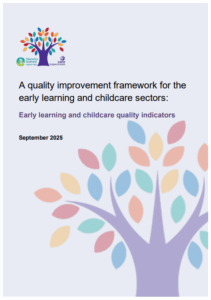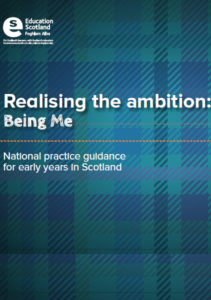Attachment
– Supporting your Self-Evaluation
Learning, Teaching and Assessment p39 – Children’s Learning and Engagement
We understand the importance of building relationships and developing secure attachments with children. As a result, relationships with children, and between children, are very positive and enable them to feel valued, safe and secure. Clear, consistent routines and expectations help children settle, build confidence and develop independence in their learning.
Learning, Teaching and Assessment p40 – Interactions to Support Learning
We have a very good understanding of early learning pedagogy and skilfully put this into practice to support children’s learning. Respectful, responsive relationships and children’s rights are at the heart of all our interactions. We listen carefully to all children’s views and are attuned to their needs, interests and learning styles. We value their opinions and support all children to express their views.
Respectful, responsive relationships and children’s rights are at the heart of all our interactions. We listen carefully to all children’s views and are attuned to their needs, interests and learning styles. We value their opinions and support all children to express their views.
Our interactions promote a calm, purposeful learning environment. We thoughtfully support children to understand expectations and manage their behaviour in ways that enable everyone to learn well together. We interact sensitively with parents/carers and involve them in all aspects of their child’s learning.
Nurturing Care and Support p45 – Nurturing Care
Our practice is built on the understanding that nurturing relationships are essential for children’s growth and development. Children experience warm, consistent and responsive care that fosters their wellbeing. They are safe, sensitively cared for and skilfully helped to express their needs.
We ensure consistency in who provides a child’s care and support and how it is provided. Consistency in routines such as mealtimes, nap times and personal care provide our children with a sense of safety and security. We recognise these daily routines provide rich opportunities to connect with children and support their growth and development.
p51
Does our approach to transitions help children to feel safe and secure? How do we know our approach is effective?
Wellbeing, Inclusion and Equality p53 – Positive Relationships and Wellbeing
We support children to understand and manage their emotions and behaviour in ways that promote positive relationships, engagement and inclusion. We understand fully that relationships lie at the heart of children’s development and lay the foundation for lifelong learning and wellbeing. The wellbeing of children and families is paramount and is central to the work of our setting.
Safeguarding And Child Protection p67 – Empowering Children and Staff
We apply a trauma-informed lens to all of our practice and interactions with children, their families and people within and outside of our team. We nurture trusting and respectful relationships with children, families and the local community. Our interactions are underpinned by children’s rights. We know individual children very well.
p69
What evidence tells us that we are effectively using a trauma-informed approach?
p32
Although attachment is significant throughout a child’s lifespan, the early attachment process can have a life-long impact on how children deal with change and uncertainty. According to O’Connor, the securely attached child is building up an image of themselves as someone who is ‘lovable and well-loved’ (2018:5)


